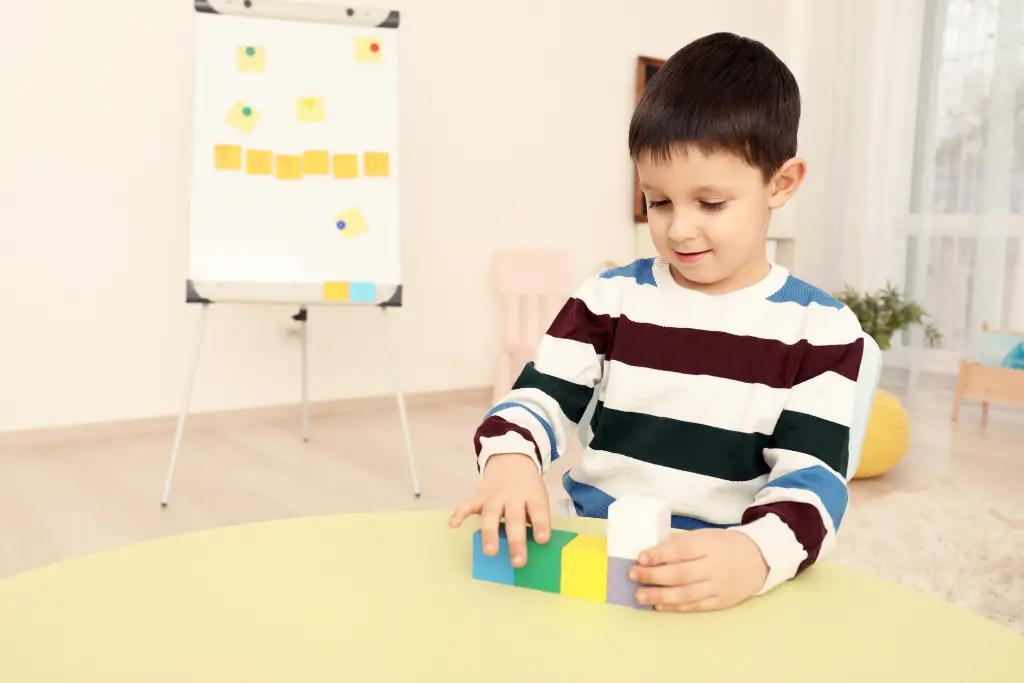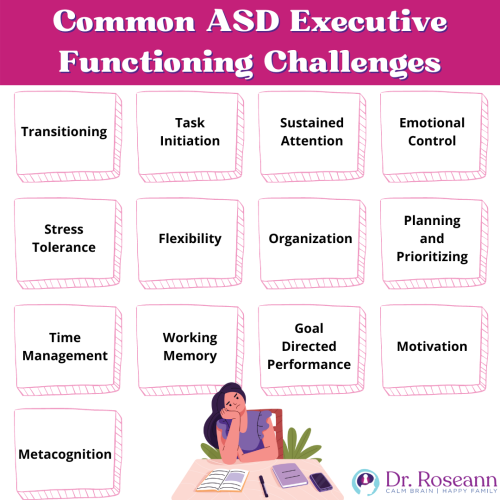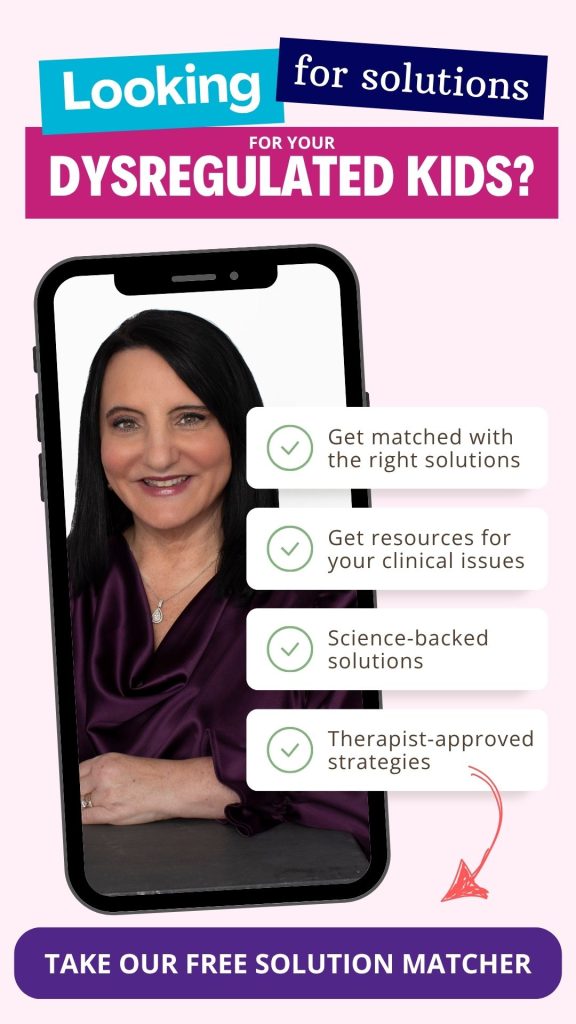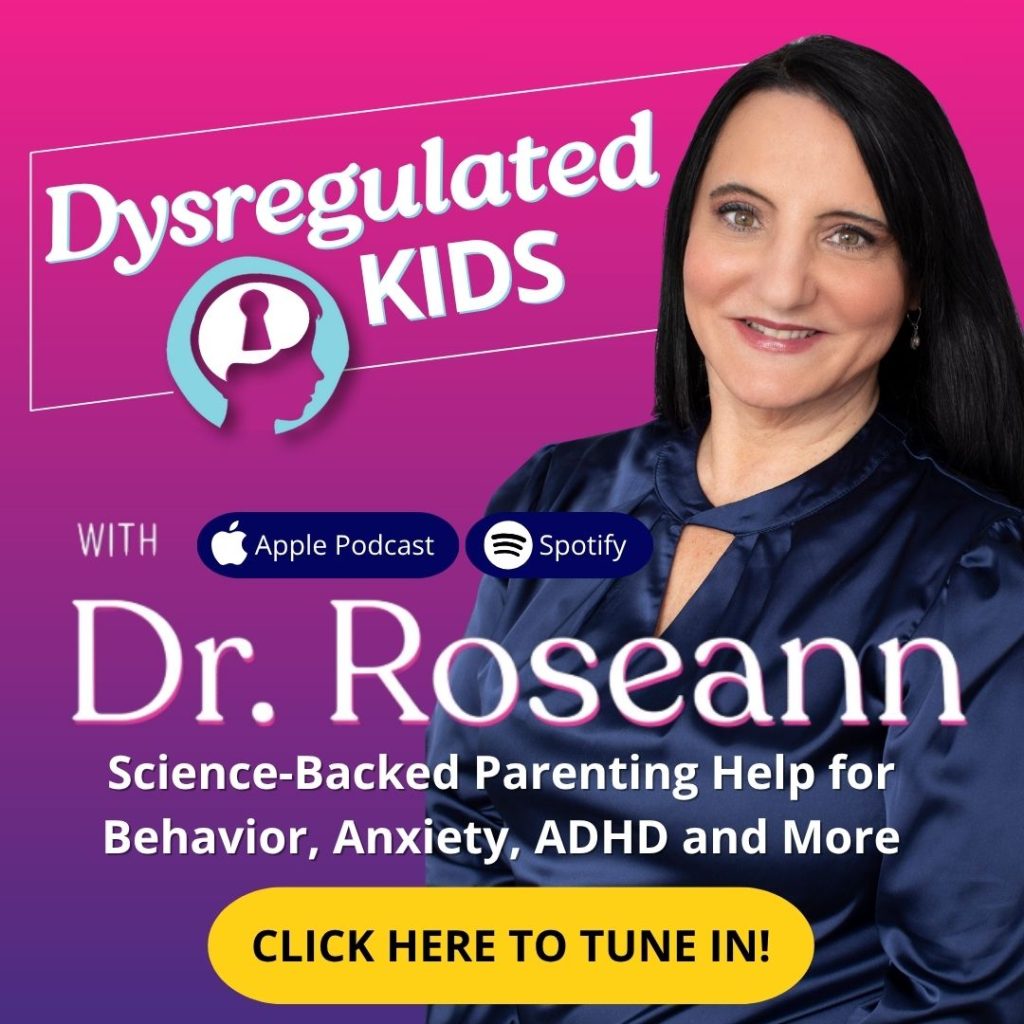
Estimated reading time: 7 minutes
Autism and executive functioning often go hand in hand, making everyday things—from starting homework to managing emotions—feel overwhelming for both kids and parents.
In this article, you’ll learn what executive functioning is in autistic children, how it shows up, how to tell when your child is struggling, and what science-backed, parent-friendly strategies you can use right now.
What is Executive Functioning in Children with Autism?
Executive functioning is like the brain’s manager. It helps us plan, get started, stay organized, switch gears when needed, remember important information, control impulses, and manage emotions.
These skills work together to keep daily life running smoothly — from finishing homework, to following routines, to handling unexpected changes.
For autistic children, executive functioning often develops differently. Instead of growing in a steady, balanced way, these skills can be uneven or harder to put together. A child may have a great memory for details but struggle to see the bigger picture.
Another might do well with a familiar routine but get overwhelmed if plans suddenly change. Difficulties with impulse control and emotional regulation are also common, which can make schoolwork, friendships, and transitions more challenging.
Executive Functioning Skills That Are Often Difficult For Autistic Children
Here are common EF skills that are especially challenging, along with what they might look like in everyday life:
How to Tell If Your Child Has Executive Dysfunction
Sometimes, it's subtle. Here are red flags and what to watch for, by age.
- Signs at home
- Repeated reminders needed for daily tasks (getting dressed, brushing teeth)
- Difficulty finishing tasks once started
- Overwhelmed by change (a small schedule change causes a big meltdown)
- Repeated reminders needed for daily tasks (getting dressed, brushing teeth)
- Signs at school
- Incomplete assignments, trouble following multi-step directions
- Teacher reports of distractibility, disorganization
- Avoidance of projects that require planning
- Incomplete assignments, trouble following multi-step directions
- By age group differences
- Preschool: Issues with following routines, impulse control
- Elementary: Homework & organization challenges, shifting tasks
- Pre-teens / Teens: Time management, planning for future, self-regulation during transitions
- Preschool: Issues with following routines, impulse control

Strategies That Help Improve Executive Functioning In Autism at Home and School
You can support these skills. Here are actionable, science-backed strategies:
- Use routines & visual supports
- Picture schedules, visual checklists, timers
- Predictable daily structure helps reduce overwhelm
- Picture schedules, visual checklists, timers
- Break tasks into small steps
- Instead of “clean your room”, try “put toys in bin”, “fold clothes”, etc.
- Use consistent scripts (“First we X, then Y, then Z”)
- Instead of “clean your room”, try “put toys in bin”, “fold clothes”, etc.
- Teach and model emotional regulation
- When dysregulated, coach (“I see you’re upset. Let’s take 3 deep breaths.”)
- Use calm down corners/tools: sensory items, calm music, etc.
- When dysregulated, coach (“I see you’re upset. Let’s take 3 deep breaths.”)
- Practice cognitive flexibility
- Role-play surprises or changes (“What if we change the game rules?”)
- Use games that require switching rules or perspectives
- Role-play surprises or changes (“What if we change the game rules?”)
- Use external tools & technology
- Timers, alarms, planners, reminders on phone/tablet
- Apps built for organizing tasks or visual task management
- Timers, alarms, planners, reminders on phone/tablet
- At school collaboration
- Teachers using scaffolding (step-by-step instructions)
- Accommodations: extra time, visual cues, peer support
- Teachers using scaffolding (step-by-step instructions)

How Is Executive Functioning Assessed?
Understanding what to expect helps reduce anxiety about evaluations and ensures you get useful feedback.
- Standardized rating scales
- BRIEF (Behavior Rating Inventory of Executive Function) – parent/teacher versions
- Brown Executive Function / Attention Scales
- BRIEF (Behavior Rating Inventory of Executive Function) – parent/teacher versions
- Performance-based tests
- D-KEFS (Delis-Kaplan Executive Function System)
- NEPSY-II for younger children
- Go/No-Go, Wisconsin Card Sorting Test etc.
- D-KEFS (Delis-Kaplan Executive Function System)
- Observational reports
- From parents, teachers: what happens in natural settings
- Patterns over time (e.g., always late with assignments, always gets upset during transitions)
- From parents, teachers: what happens in natural settings
How Autism Differs From ADHD In Terms of Executive Functioning
There’s overlap—but also important differences.
SimilaritiesDifferencesBoth may show issues with attention, impulse control, working memoryIn autism, rigidity of routine and sensory processing differences often play a bigger roleBoth may benefit from external supports, structure, routinesADHD tends to have more fluctuation in attention span; autism may have more challenges with social understanding and flexibilityBoth can feel overwhelming to parentsIn autism, emotional regulation may be tied more to sensory overload or social stress; in ADHD, may be more driven by distractibility and impulsivity
Understanding these differences helps tailor what works best for your child, not just a generic approach.
Can Executive Functioning Skills Improve Over Time?
Yes—they absolutely can. Brain development is ongoing, and with the right supports, many kids make real progress.
- Evidence of improvement
- Interventions combining behavioral techniques + occupational therapy show benefit in daily living skills, self-monitoring.
- Visual supports, social narratives, video modeling have been shown to strengthen working memory, impulse control, flexibility.
- Interventions combining behavioral techniques + occupational therapy show benefit in daily living skills, self-monitoring.
- What helps best
- Consistency over time—regular routine, repeated practice
- Multi-setting support—home + school + therapy
- Engagement in physical activity—motor interventions or fitness help EF and social skills. Recent research shows physical fitness is linked to better EF and social outcomes in kids with ASD.
- Consistency over time—regular routine, repeated practice

When Should You Seek Professional Help
If you're seeing persistent, interfering struggles despite trying supports, it may help to reach out.
- Signs it’s time
- Child’s anxiety or meltdowns are frequent around daily tasks
- School performance is suffering even with accommodations
- Family routines are always a battleground, causing stress for everyone
- Child’s anxiety or meltdowns are frequent around daily tasks
- Professionals who can help
- Clinical psychologists with experience in ASD
- Occupational therapists (OTs) who specialize in sensory & executive function
- Behavior therapists / ABA-informed support
- Neuropsychologists (for formal assessments)
- Clinical psychologists with experience in ASD
- What to ask/expect
- Assessments of EF across environments (home, school)
- Clear report of strengths and challenges
- Recommendations that are practical: routines, visuals, supports rather than only clinical jargon
- Assessments of EF across environments (home, school)
Read more about: A Nervous System Approach to Autism Treatment: What Every Parent Needs to Know
Parent Action Steps
Break tasks into small steps so your child feels success along the way Use visual schedules or checklists so your child knows what to expect Show how you calmly adapt when plans change so your child learns by example Teach simple calming tools like deep breathing or movement breaks to handle big feelings Solve problems together step by step so your child practices flexible thinking
FAQs
Can executive dysfunction be misdiagnosed as something else?
Yes. Sometimes what looks like laziness or procrastination might be executive dysfunction. Also, ADHD, anxiety, sensory issues, or learning disorders often overlap. Getting a thorough assessment helps clarify what’s going on.
Are medications helpful for executive functioning in autism?
Medication is not a first line for executive functioning by itself. Sometimes, if EF problems are tied to ADHD symptoms or anxiety, medications may help with focus or impulse control—but they work best paired with behavioral tools, visual supports, routines, etc.
At what age should supports begin for executive functioning?
As early as possible. Even preschool age (3-5 years), you can use routines, visuals, simple games that build working memory, flexibility, and emotional regulation. Early stops overwhelm later on.
My child seems advanced in some areas but struggles in others—does that mean EF can’t be improved?
Not at all. Strengths in one area can be used to support growth in weaker areas. Growth often comes in uneven spurts—celebrating small wins makes a big difference.
Citations
Wang, Q., Jia, S., Cai, Z., Jiang, W., Wang, X., & Wang, J. (2025). The canonical correlation between executive function and social skills in children with autism spectrum disorder and potential pathways to physical fitness. Scientific Reports, 15, Article 10367. https://doi.org/10.1038/s41598-025-94334-1
Tse, A. C. Y., Liu, V. H. L., Lee, P. H., Anderson, D. I., & Lakes, K. D. (2024). The relationships among executive functions, self-regulation, and physical exercise in children with autism spectrum disorder. Autism, 28(2), 327-341. https://doi.org/10.1177/13623613231168944
Hilton, C. L., Collins, D., Jones, J., Flanagan, J., Carillo, C., & Ratcliff, K. (2025). Outcomes from 35-minute daily exercise program for autistic adolescents: Fit Club program effects on executive functioning, planning/organizing, and flexibility. Research in Autism Spectrum Disorders, 119, Article 102504. https://doi.org/10.1016/j.rasd.2024.102504
Dr. Roseann Capanna-Hodge is a licensed mental health expert that is frequently cited in the media:
- Parents Are Your Kid’s Meltdowns a Sign of Rejection Sensitive Dysphoria?
- Scary Mommy What Is Self-Regulation In Children, And How Can You Help Improve It?
- Medicinal Media Different minds grow awareness: understanding the autism spectrum
Disclaimer: This article is not intended to give health advice and it is recommended to consult with a physician before beginning any new wellness regime. *The effectiveness of diagnosis and treatment vary by patient and condition. Dr. Roseann Capanna-Hodge, LLC does not guarantee certain results.
Are you looking for SOLUTIONS for your struggling child or teen?
Dr. Roseann and her team are all about science-backed solutions, so you are in the right place!
Manage Autism and executive functioning

©Roseann Capanna-Hodge

%20.png)















